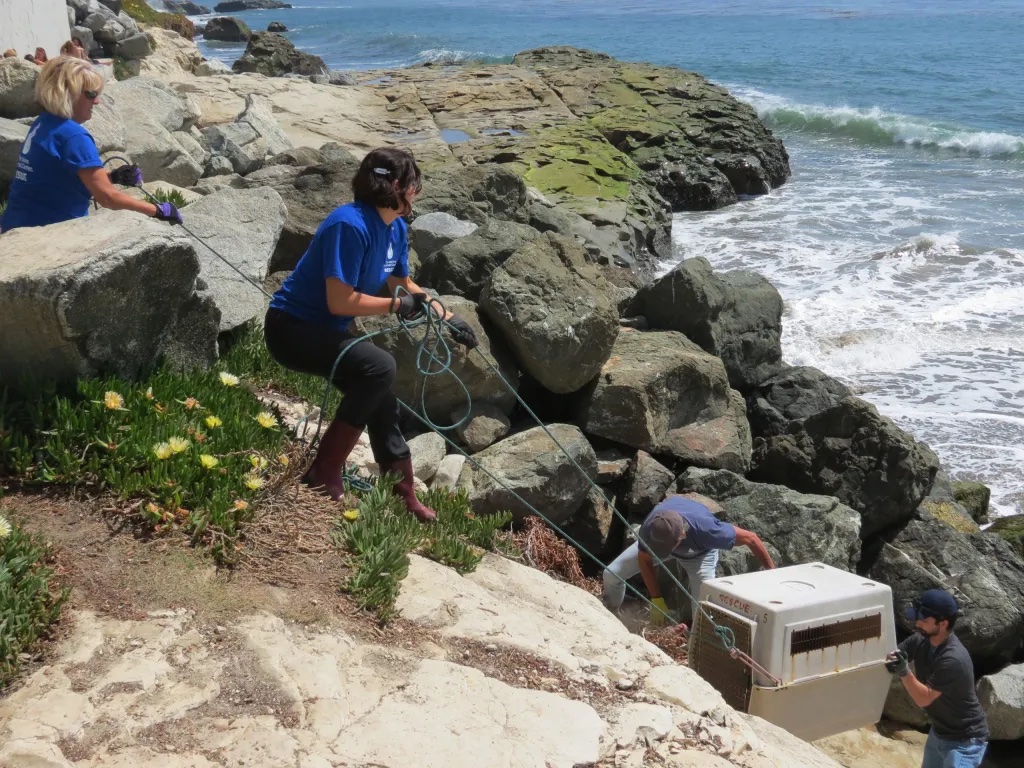Highlighting hundreds of cases of marine mammals admitted for emergency care, the Marine Mammal Center is calling on beachgoers to keep their distance, keep their dogs leashed and call the professionals if they see an animal in distress.
Based in Marin County, the Marine Mammal Center is the world’s largest hospital for marine mammals, and the center’s Electronic Animal Record System team has gathered data for the last two years that shows an alarming trend. The team reported humans and dogs to be a contributing factor in more than 200 cases of marine mammal rescues last year, accounting for 30 percent of all patients admitted — up from 26 percent in 2022.
“Marine mammal disturbance along our vast 600-mile California response range is both a tourist and a local issue that we’re dedicating more resources toward to help find solutions,” said Adam Ratner, Marine Mammal Center director of conservation engagement. “Our research shows that the vast majority of people on the beaches want to help these animals, but they don’t know how to best help. Our work is focused on trying to help empower them to take the right actions to protect marine mammals.”

When it comes to the culprits causing distress or harm, wildlife experts identified two problematic archetypes — “the wildlife protector” and “the experience seeker.”
The former represents someone who might be trying to help an animal believed to be in distress, but because they lack the training or knowledge can actually cause more harm. The latter represents a tourist seeking an experience with marine life for social media.
While both archetypes are generally not intending to harm the animals, both are getting way too close, explained Giancarlo Rulli, the center’s public relations manager and longtime volunteer. Crowding around an animal can lead to increased stress levels, and it can separate mothers from their pups, he added.
Rulli encouraged beachgoers to follow three simple rules: 1) keep their distance 2) call the experts at (415) 289-SEAL if an animal seems in distress instead of trying to help and 3) use their camera’s zoom feature when taking pictures to maintain appropriate distance. If the animal reacts to their presence, they’re too close.
He underscored the important role the public can play in being the center’s eyes and ears.
“In any given year, we receive 10,000 to 15,000 calls coming into our hotline to report a potential marine mammal in distress,” Rulli said.
The California sea lion is the number one marine mammal the center helps because it’s also the one most likely to garner attention.
“They’re charismatic. And that’s also part of the thing that we see with people getting too close. There’s a cuteness factor, and they certainly draw you in,” Rulli said. “But the best thing to remember, whether it’s for your dog or for yourself, is that these are wild animals.”
In fact, the trained rescue team and caretakers at the center mask their human forms with herding boards while the animals are recovering at the hospital. This is both for safety and to discourage bonding.
“We are very concerned about spending too much time with the animals behind the scenes, because we don’t want to create that connective bond,” he explained. “The best thing for those marine mammals is to make sure that they’re not associating us with food and medicine, so we can return them to the wild and they can maintain those wild instincts.”
For those interested in getting involved at a deeper level, Rulli encouraged potential volunteers to explore the options posted on MarineMammalCenter.org.
“The thing that makes the center truly unique is that no matter your passion or interest area, there’s an opportunity. There’s a little bit of something for everyone,” he said, noting that the center has formed a strong community of volunteers. “We always say people come for the animals, but they stay for the people.”
On his own experience volunteering for more than half his life, Rulli said he wouldn’t change it for anything.
“It’s had a profound impact on who I am. I feel, as many folks here feel, that we’re making a difference,” Rulli continued. “The ocean and the marine mammals that we’re rescuing provide windows into the health of our ocean in real time. And they’re often an early alert system to issues that can impact human health as well.”
“And so to be able to be a part of that and feel that you’re making a difference in some small way is something that I take to heart, and it’s why I truly love both working here as a staff member but also having dedicated 20 years of volunteer service to,” he concluded.
The post Marine Mammal Center in Marin County urges human behavior change amid spike in rescue appeared first on Local News Matters.
